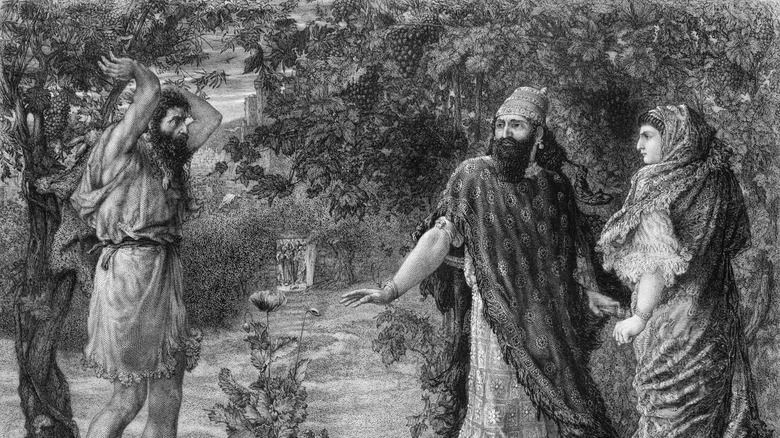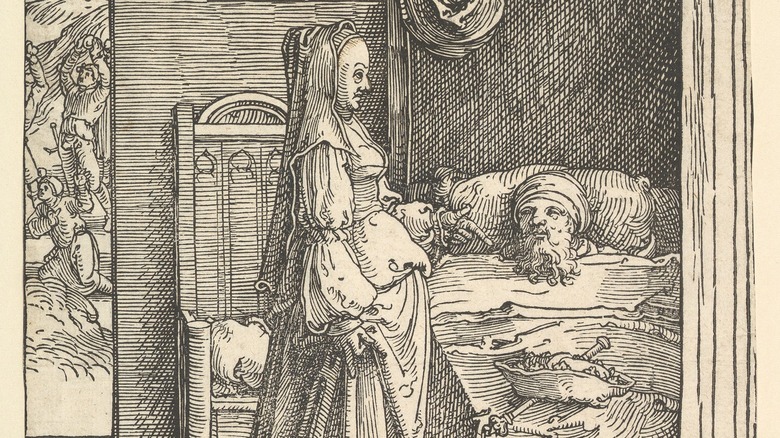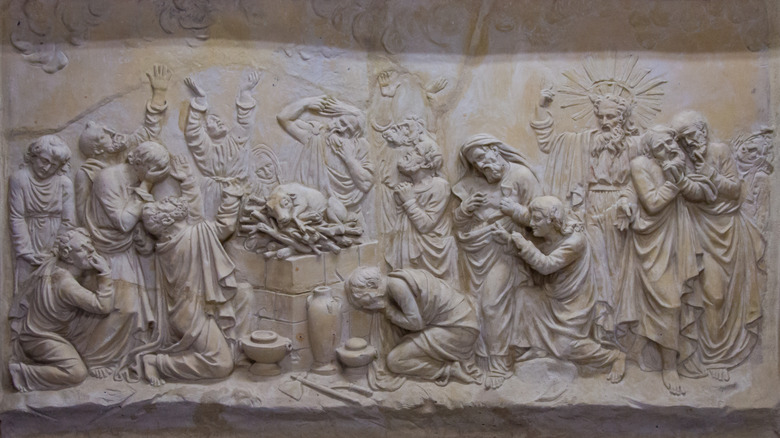The Truth About Ahab And Elijah's Battle In The Bible
The Bible is filled with narratives about rivalries. For example, the first murder recorded in the Good Book happens within its first few pages, when Adam's son Cain murders his brother Abel in a fit of jealousy. Similarly, in 1 Samuel, King Saul and his protege, David, start out as dear friends but ultimately find themselves at odds over Saul's fears that David is trying to usurp him as king.
One of the most compelling narratives about a Biblical rivalry occurs in 1 Kings 18, wherein God's prophet Elijah and the prophets of the Philistine god Baal compete to see which god will respond to the prophets' pleas. And while the Bible is rather thin on jokes, some of Elijah's taunting of the enemy prophets is downright comical.
In a way, the battle between the two gods was a proxy battle between Elijah and his king, Ahab, who with his wife, Jezebel, was keen to get rid of all of the prophets of God and kill anyone who refused to worship Baal.
A wicked king and his wicked(er) wife
By the time King Ahab of Israel was appointed king, he'd been preceded by a long line of kings who "did evil in the eyes of the lord" by worshipping idols, as I Kings 16 describes it. However, Ahab took things to the next level: Not only did he do "more evil in the eyes of the Lord than any of those before him," he married a foreign woman, Jezebel, who herself worshipped idols.
Indeed, as Jewish Encyclopedia notes, Jezebel compelled her husband to build altars so that she could worship her gods, and Ahab himself began worshipping them. What's more, she wanted the worship of Baal and Asherah to be the national religion of Israel, going so far as to violently murder prophets of God. But one prophet, Obadiah, was able to get 100 of them to safety, hiding them in a cave and secretly feeding them while a famine raged across the land.
A battle of the gods
In 1 Kings 18, the Bible gives us what is essentially a battle of the gods. Upon seeing Elijah, the prophet Obadiah realizes that if he doesn't give him up to King Ahab, he's toast. So Elijah agrees to meet his adversary face to face.
The two meet on Mount Carmel, and after some verbal sparring, Elijah suggests a test to see which god is real. The prophets of Baal will build an altar, put a sacrificial bull on top, and call upon their god to consume it by fire. Elijah would do the same on God's behalf, and whichever responded would be the true deity. Ahab agreed.
For hours, the Baal prophets begged their god to respond and received no response. At one point, Elijah taunted them, saying, in some translations, that perhaps Baal was using the restroom. Indeed, though the New International Version (cited above) suggests Baal was "busy," Stack Exchange suggests that the Hebrew word used there was, in its context, a euphemism for "relieving himself." No word on whether the text suggests Baal was doing "number one" or "number two."
When Elijah's turn finally came, he not only built the altar and put the sacrificial bull on top, he ordered trenches dug with water built around it, and the entire thing soaked. Then, on command, God called down fire that consumed the bull, the altar, and the water in the trenches around it.
The aftermath
Two things happened immediately after Elijah's victory, according to 1 Kings 18. First, Elijah ordered the prophets of Baal gathered up and slaughtered. Second, it started raining, effectively signaling an end to the drought and famine that had ravaged the land up until that point.
In 1 Kings 19, Ahab returns home to tell his wife about Elijah's victory, and she's having none of it. She promises to have her adversary killed by the next day, lest her own gods deal with her "ever so severely," as the narrative reads.
In fact, according to Jewish Encyclopedia, Jezebel wouldn't succeed in killing Elijah and would get her own comeuppance three years later. After Ahab was killed in battle, her two sons would briefly occupy their father's place on his throne. Jezebel herself is killed in an insurrection led by Jehu after she is thrown out of a window and trampled underfoot by horses, as 2 Kings 9 explains.



